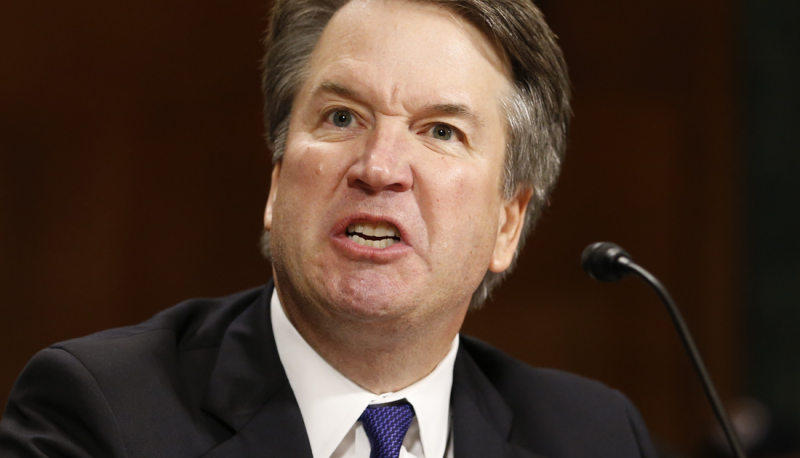“Confirmed Judges, Confirmed Fears” is a blog series documenting the harmful impact of President Trump’s judges on Americans’ rights and liberties. Cases in the series can be found by issue and by judge at this link
Trump justice Brett Kavanaugh wrote, and Trump justices Neil Gorsuch and Amy Coney Barrett also cast deciding votes in, a 6-3 decision that effectively reversed prior precedent, approved sentencing of a 15 year-old to life in prison without possible parole, and made it much easier to do the same in the future, without making specific findings of incorrigibility as required by previous decisions. The April 2021 ruling was in Jones v Mississippi.
For almost two decades, the Supreme Court has recognized that “children are constitutionally different from adults for purposes of sentencing.” After ruling in 2005 that the Eighth Amendment ban on cruel and unusual punishment forbids sentencing juvenile offenders to death, the Court began to consider the question of sentencing juveniles to life in prison without any possibility of parole (LWOP). In Miller v. Alabama (2012), the Court ruled that LWOP for juveniles is permissible, but only where the crime was murder and the sentence “is not mandatory and the sentencer therefore has discretion to impose a lesser punishment,” so that the sentencer distinguishes between the juvenile offender “whose crime reflects unfortunate and transient immaturity” and the “rare juvenile offender whose crime reflects irreparable corruption.”
The Court elaborated on Miller in Montgomery v Louisiana (2016), where the Court ruled that Miller created substantive rights and thus should be applied retroactively to past cases that are still pending. Montgomery explained that after Miller, a post-conviction “hearing” is “necessary to separate those juveniles who may be sentenced to life without parole from those who may not.” Such hearings, the Court continued, allow juveniles to vindicate their “substantive” right to try to show that “their crime did not reflect irreparable corruption” or incorrigibility, and, “if it did not, their hope for years of life outside prison must be restored.”
Both Justice Anthony Kennedy and Ruth Bader Ginsburg played important roles in these decisions. As Justice Sotomayor pointed out in her dissent in this case, “many States have already implemented robust procedures to give effect” to the requirement that sentencers make substantive determinations to “separate those juveniles who may be sentenced to life without parole from those who may not.”
Mississippi is not one of those states. Before Miller, Brett Jones was sentenced to LWOP for killing his grandfather just after his 15th birthday, under a law that made such a sentence mandatory. After Miller, a state appeals court sent the case back to a lower court for resentencing. The sentencing court recognized that it now had discretion about a LWOP sentence after Miller, but did not make any findings about Jones being incorrigible or about such factors as the previous abuse Jones had suffered, his loss of “access to medications that he had been taking for mental health issues” some weeks before the killing, and Jones’ attempt to “save his grandfather by administering CPR” after the stabbing. State courts rejected Jones’ appeal, and the case went to the Supreme Court.
Trump justice Brett Kavanaugh wrote a majority opinion, claiming that prior precedent did not require a determination by the sentencing judge as to whether Jones was irreparably incorrigible before imposing LWOP. Instead, Kavanaugh claimed, Miller and Montgomery required only that there be a “discretionary sentencing procedure” under which the sentencer could decide, for whatever reason, not to impose LWOP. According to Kavanuagh and the majority, no “factual finding of permanent incorrigibility,” or even an on-the-record “explanation,” is required. The majority thus affirmed the Mississippi court’s decision and rejected Jones’ appeal. Although agreeing with the majority result, Justice Clarence Thomas recognized that the majority had adopted a “strained reading” of the Montgomery case and should have overruled the decision “in name” as well as “in substance.”
Justice Sonia Sotomayor was much more direct in her strong dissent for herself and Justices Stephen Breyer and Elena Kagan. Despite Kavanaugh’s claim that he was following Miller and Montgomery, she began, the majority “guts” both decisions by claiming that a juvenile can be sentenced to LWOP as long as the sentence is not mandatory and the sentencer has “discretion” to impose a lesser punishment. The majority’s conclusion “would come as a shock” to the courts in those cases, Sotomayor continued, in light of their clear requirement that there be a determination of incorrigibility, as discussed above. The majority “is fooling no one,” Sotomayor went on, by falsely claiming that its decision “carefully follows” prior precedent.
Instead, Sotomayor wrote, Kavanaugh’s opinion “distorts Miller and Montgomery beyond recognition.” Instead of fairly considering the factors suggested by Kavanaugh himself in prior cases concerning reconsideration of past precedent, she continued, the majority “simply rewrites” these decisions “to say what the Court now wishes they had said, and then denies that it has done any such thing.”
The longer term effects of the ruling made possible by Trump justices Kavanaugh, Gorsuch, and Barrett remain unclear. As Sotomayor pointed out, many states have already adopted procedures that require determinations of incorrigibility before LWOP can be imposed on a juvenile. But many others have not. For Jones and other young people like him, that means, as Sotomayor lamented, there will be “no chance” in their entire lives for rehabilitation and “fulfillment outside prison walls, no chance for reconciliation with society, no hope.” And these consequences will “not fall equally,” Sotomayor pointed out, since “70 percent of all youths sentenced to LWOP are children of color.” This tragic decision is yet another example of the harm done by Trump justices and judges and the importance of our fight for our courts.

